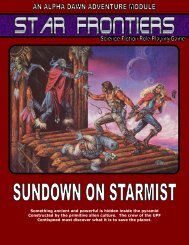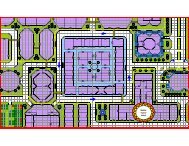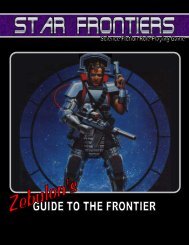Alpha Dawn - Star Frontiersman
Alpha Dawn - Star Frontiersman
Alpha Dawn - Star Frontiersman
You also want an ePaper? Increase the reach of your titles
YUMPU automatically turns print PDFs into web optimized ePapers that Google loves.
11 Simplified<br />
Skills<br />
Some people don’t like having to reference a list of<br />
percentages and subskills when trying to do<br />
something skill-related with their character. Other<br />
players may dislike the fact that skills are<br />
completely detached from ability scores (why does<br />
my DEX help me shoot a foe with my Beam<br />
Weapons skill, but it doesn’t make any difference<br />
when trying to defuse a demolitions charge?). If<br />
you fall in one of these categories, this rule is for<br />
you.<br />
Instead of using the list of subskills, players use the<br />
same rules as they do for combat. Simply take half<br />
your appropriate ability score then add ten times<br />
your skill level in the skill in question. Which ability<br />
score to use depends on the circumstances, and the<br />
type of skill roll you’re trying to make.<br />
For example, your character is looking at a robot at<br />
an auction, and deciding whether or not it would be<br />
a good purchase. In this case, he would use half his<br />
Intuition as his base score, plus ten times his<br />
Robotics skill. Later, he gets it home and starts<br />
working on repairing its broken track wheel, using<br />
his Logic as his base score.<br />
Modifiers. Just like combat (both ranged and<br />
melee) has a list of modifiers, so too should the<br />
referee impose penalties and bonuses based on how<br />
complex the action is. This is left up to the<br />
discretion of the referee, but situational modifiers of<br />
+30 to -30 should be a general guideline.<br />
Using Skills<br />
Skills are used differently.<br />
Previously, abilities had nothing to<br />
do with skill success rates. Thus,<br />
a dexterous character had no<br />
better chance to move silently<br />
than a clumsy one - skill level was<br />
all that mattered. In this system,<br />
abilities DO matter. Depending on<br />
your character’s relevant ability<br />
score, you’ll receive a modifier to<br />
your chance of success based on<br />
the table shown here.<br />
Ability Mod<br />
01-10 -20<br />
11-20 -15<br />
21-30 -10<br />
31-40 -5<br />
41-50 +0<br />
51-60 +5<br />
61-70 +10<br />
71-80 +15<br />
81-90 +20<br />
91-100 +25<br />
>100 +30<br />
Note: Combat skills do not receive this bonus. Their<br />
chance to succeed is already based on your ability<br />
score.<br />
Unskilled Skill Checks<br />
If your character doesn’t have a necessary skill, he can<br />
still take a stab at using it. Normally, this simply<br />
means not receiving a level bonus (do the math but<br />
assume his level is zero). Some subskills, however,<br />
cannot be used unskilled; they simply require too much<br />
training or specialized equipment. Your referee has the<br />
final say on whether or not a skill can be attempted.<br />
For example, your character wants to sneak past a<br />
guard. The referee tells him to make a Stealth roll<br />
(that’s a subskill of the Environmentalist skill, which<br />
your character has no levels in) with Dexterity as a<br />
modifier. Your character has a DEX score of 75, so you<br />
get to add +15 to the base chance. The base chance<br />
of Stealth is listed as “20% + level” so your chance of<br />
success is 20+0+15=35%.<br />
12<br />
Increased<br />
Punching<br />
As it stands, having a punching score of +2 isn’t<br />
that different from having a score of +4. Opponents<br />
have an average of 45 Stamina, and that makes<br />
strength have very little effect on melee combat.<br />
This rule increases the impact of Strength on melee<br />
damage.<br />
PS: Punching score is calculated in a different<br />
manner. Divide your character’s Strength score by<br />
ten, rounding up, then subtract five. This results in<br />
a number between -2 and +2, with rare occurrences<br />
of -3 or +3.<br />
Application. Instead of adding to the damage roll,<br />
it adds to each die of the damage roll. Thus, if you<br />
get to roll 5d10 for melee damage, and your<br />
punching score is +3, you get to roll 5d10+15 (that<br />
is, +3 per die). This allows Strength to play a more<br />
significant role on melee damage, and weapons<br />
designed to amplify Strength do so in a more<br />
pronounced manner.<br />
13<br />
Lethal<br />
Combat<br />
Some players and referees complain that the game<br />
as it currently stands is not lethal enough. For<br />
example, your character might have a Stamina<br />
score of 65. He really doesn’t fear much from a guy<br />
with a knife, who couldn’t do him significant damage<br />
in a single blow regardless of his level of training.<br />
In order to make combat more lethal, allow skill to<br />
add damage, using the following table for reference.<br />
This bonus applies to all combat skills.<br />
Caution. If using this optional rule in conjunction<br />
with Increased Punching Score option, Strength will<br />
play an even more pronounced role in melee combat<br />
(since we’re adding dice to the damage caused).<br />
169
















